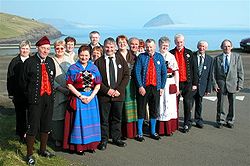 Faroese folk dancers in national costumes | |
| Total population | |
|---|---|
| c. 70,000 | |
| Regions with significant populations | |
| ≈50,000[1] | |
| 21,687[2] | |
| 1,981[3][dubious – discuss] | |
| Languages | |
| Faroese Danish (Gøtudanskt) | |
| Religion | |
| Lutheranism (Church of the Faroe Islands) Historically also the Norse religion and Roman Catholicism (1000–1538) | |
| Related ethnic groups | |
| Danes, Norwegians, Swedes, Icelanders, Celts | |
| Part of a series on the |
| Culture of the Faroe Islands |
|---|
 |
| History |
| People |
| Languages |
| Mythology and folklore |
| Cuisine |
| Festivals |
| Religion |
| Art |
| Literature |
| Music |
| Sport |
Faroese people or Faroe Islanders (Faroese: føroyingar; Danish: færinger) are an ethnic group native to the Faroe Islands.[4] The Faroese are of mixed Norse and Gaelic origins.[5] About 21,000 Faroese live in neighbouring countries, particularly in Denmark, Iceland and Norway. Most Faroese are citizens of the Kingdom of Denmark, in which the Faroe Islands are a constituent nation. The Faroese language is one of the North Germanic languages and is closely related to Icelandic and to western Norwegian varieties.
- ^ According to a 2009 estimate, the population of the Faroe Islands was 49,000, ~92% of that population was Faroese born, which is approximately 45,000. (See demographics of the Faroe Islands)
- ^ Politiken Archived 3 March 2016 at the Wayback Machine, 2006 (newspaper written in Danish)
- ^ "Table 5 Persons with immigrant background by immigration category, country background and sex. 1 January 2009". www.ssb.no. Archived from the original on 20 August 2020. Retrieved 23 July 2019.
- ^ Minahan, James (2000). One Europe, many nations: a historical dictionary of European national groups. Greenwood Publishing Group. p. 769. ISBN 0313309841. Archived from the original on 16 January 2023. Retrieved 25 May 2013.
- ^ Als, T. D.; Jorgensen, T. H.; Børglum, A. D.; Petersen, P. A.; Mors, O.; Wang, A. G. (2006). "Highly discrepant proportions of female and male Scandinavian and British Isles ancestry within the isolated population of the Faroe Islands". European Journal of Human Genetics. 14 (4): 497–504. doi:10.1038/sj.ejhg.5201578. PMID 16434998.